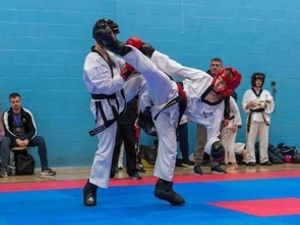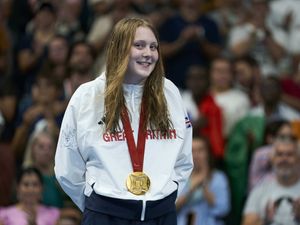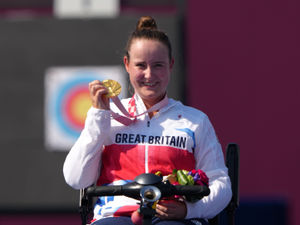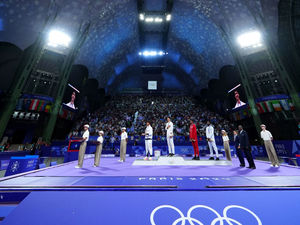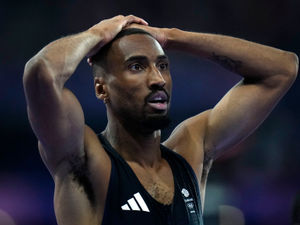Staffordshire's Adam Peaty finding peace at last ahead of Paris games
On Sunday night, Adam Peaty chases Olympic immortality secure in the knowledge life is not just about what happens in the pool.
The Staffordshire swimmer, champion in the 100 metre breaststroke at both Rio 2016 and Tokyo 2020, has the chance to become only the second man in history to win three consecutive titles in the same event.
“It would be absolutely incredible,” Peaty considers. Yet it is not, he has come to learn, an achievement which would define him.
“When I touch the wall on Sunday, if it is not the result I want, I will be disappointed,” he says.
“But before, in 2021 or even 2022, I would almost be tearing myself apart that my life wasn’t worth living because I lost. That is not sustainable.”
Just a couple of years ago, the idea of Peaty even discussing defeat would have been unthinkable. To understand the change in mindset, therefore, you have to know about the intervening period, which in the build-up to Paris 2024, Peaty has laid bare in powerful, searingly honest fashion.
It is a story of injury, defeat, heartbreak, depression and eventually salvation which has left the 29-year-old hunting his third Olympic gold with a renewed sense of perspective and purpose.
“I want to prove that you can come back from potentially the lowest of the lows and turn it around,” he explains.
That lowest point came in February last year, when Peaty climbed out of the university pool at Loughborough, tears filling his goggles, telling his long-time coach Mel Marshall he was “done”.
It was the bottom of a downward spiral of “self-destruction” which probably began, he now reflects, in the aftermath of winning his second gold in Tokyo three summers ago and continued through 2022, when Peaty broke his foot, rushed back for the Commonwealth Games in Birmingham and was beaten for the first time over 100m in his senior swimming career.
There followed the break-up with Eiri Munro, the mother of his three-year old son, George. Peaty admits having turned to drink during the darkest times.
His return to the light was slow and steady, not determined by one event but a series which helped him find peace.
Among the most important was his introduction to Olympic chaplain and academic Dr Ashley Null, who encouraged Peaty to look at sport differently and also led to him discovering religion.
Then, last summer, he began dating Holly Ramsey, the daughter of TV chef Gordon. Those relationships have restored some stability and culminated in the point where Peaty finds himself sitting at the GB preparatory camp in Reims, just a few days out from competition, claiming to be the calmest he has ever been.
He certainly cuts a different figure, much less macho, far more considered. Peaty is not the first or last athlete to have struggles away from their sport. There have been few others, however, able to articulate their experience so well. When explaining the change, Peaty references a line from the 2007 film American Gangster, which he had watched the evening before with team-mate James Guy.
“It says the loudest man in the room is the weakest,” he says. “That is so true. I don’t have to shout from the rooftops that I am good, or I am going to do this.
“I know in my own ability what I am capable of and I just have to execute that ability now.”
He continues: “Because I have been there and done it, at both Games I have been to, my relationship with a gold medal now is that I know it won’t solve all the problems I want it to. When you are younger you think if I get a gold medal it will solve so many problems – and it does in some respects. But it doesn’t solve the problems you seek.”
And yet still, he wants it. Peaty is at pains to point out his more relaxed attitude should not be confused for a lack of hunger.
When it is suggested he might feel pride simply for being on the start line, considering everything which has come before, he replies: “I think so but I am not one of those to give out medals just for turning up.
“My mentality is not just making the starting line. We need some gratification too as athletes, to see that it has paid off because the investment in this journey has been so much in terms of energy, time, focus, all aspects.
“The investment has been huge and I would like to see a reward for that.
“Getting to the starting line is a huge one for me but I feel like I am already there now. The focus now is OK, I am here, how do I turn it into a win?”
You could never describe Peaty, who still owns the 14 fastest times ever in his event and remains the only man to have gone under 57 seconds, as an underdog.
Yet for the first time at an Olympics, neither is he the clear favourite. That honour probably belongs to China’s Qin Haiyang, the 2023 world champion, who beat Peaty at a World Cup event in October last year.
Any thoughts that result might have marked a changing of the guard, however, disappeared when Peaty won the British title in April with a world’s best time of 57.94, his own fastest since Tokyo.
On the eve of Paris, he is clearly taking some enjoyment from the fact his rivals are pretty much in the dark as to what precisely he can deliver. Tomorrow morning’s opening heats should provide the first inkling, though Peaty’s focus is solely on being at his best come Sunday night.
“I never know until the day, really,” he replies when asked about his form. “You may have a little inkling a day, or two days before.
“It is all about getting our peak at the right moment. If we miss it by a day, we are going to be out of it.
“It is definitely going to be different tactically and a different strategy this time. Just for energy reservation we are going to go through the rounds and hopefully get good seeds.
“It is so different to what I was seeking in Tokyo and even what I was trying to do in Rio.
“I know I have nothing to prove here. I didn’t go to the world championships last year and there are going to be people out there who have something to prove in the heats.
“That isn’t going to be me. I am not going to tell you what my strategy is going to be. But I think everyone would agree, you want your best in the final.”
Unlike Tokyo, where gold was won behind closed doors, Peaty’s family will be present in Paris. That includes George, with whom he has been speaking to on FaceTime every day and who provides another source of motivation and reason to compete.
“He always asks: ‘Daddy, are you the fastest boy?’” says Peaty. “That is my purpose now, to prove I am the fastest boy to my son.
“He only sees it as you win or lose and you will forget it after a day.
“That is my simple reason why I am doing something. I am a very emotional person and I use my emotions to my advantage when it is required now.
“There are so many other reasons why I am here and why I am doing it but you have to go through that low period, in any career, and ask why you are doing something? I know why I am here now.”
For Peaty, the goal has never changed. Only the reasons for wanting it now are different.
“It is one of the greatest things an athlete can do, not just win the Olympic Games but then try to do it twice and try to do it three times,” he says.
“There is a reason why not many people do it. I know that now because I have been through it and it will send you round and round and round if you try and force it.
“It has cost a lot to get here and I was willing to pay that cost. I am excited to see what we can do.
“But it won’t define me as a human. Maybe as an athlete, yes. Maybe other people will see it that way.
“For me, I will still have my family. They are healthy, happy. The sun always rises next morning, no matter what.
“That is not defeatist, in any sense. That just gives me peace, so you can attack.
“It is almost like a prayer before a battle. I know there is no pressure from that side.
“It is only a positive pressure, something I have talked about all year which is this positive, peaceful approach I have got.
“I enjoy being in the final when people don’t know what you are going to do. Put all those pieces together and we will see.”

